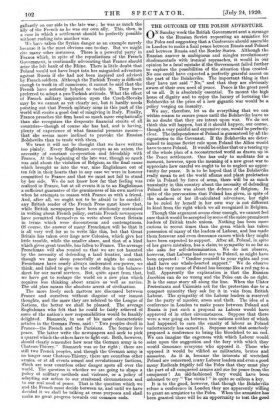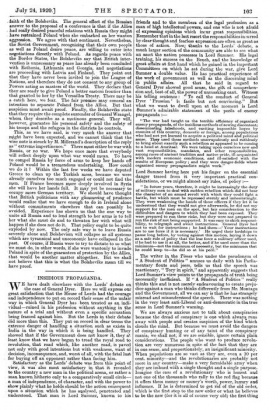THE OUTCOME OF THE POLISH ADVENTURE.
ON Sunday week the British Government sent a message to the Russian Soviet requesting an armistice for the Poles and suggesting that a Conference should assemble in London to make a final peace between Russia and Poland and between Russia and the Border States. Although the Russian answer is ambiguous and mingles revolutionary rhodomontade with ironical reproaches, it would in our opinion be a fatal mistake if the Government failed further to explore the possibilities of the situation thus created. No one could have expected a perfectly graceful assent on the part of the Bolsheviks. The important thing is that they have not said "No," and that they are obviously aware of their own need of peace. Peace is the great need of us all. It is absolutely essential. To mount the high horse of dignity and to enjoy the luxury of lecturing the Bolsheviks at the price of a new gigantic war would be a policy verging on insanity. We say, therefore, let us do everything that we can within reason to ensure peace until the Bolsheviks leave us in no doubt that they are intent upon war. We do not think this will happen, but if it should happen, our course, though a very painful and expensive one, would be perfectly clear. The independence of Poland is guaranteed by all the signatories to the Covenant. If the Bolsheviks are deter- mined to impose Soviet rule upon Poland the Allies would have to save Poland. It would be either that or a tearing up of the whole plan of a reconstructed world as drawn up in the Peace settlement. One has only to meditate for a moment, however, upon the meaning of a new great war to appreciate how careful we ought to be to neglect no oppor- tunity for peace. It is to be hoped that if the Bolsheviks really, mean to set the world aflame and plant proletarian rule in Poland by force of arms, there will be as much unanimity in this country about the necessity of defending Poland as there was about the defence of Belgium. In spite of the provocation that Poland has given, in spite of the madness of her ill-calculated adventure, her right to be ruled by herself in her own way is not different in kind from the right which we all recognized in Belgium.
Though this argument seems clear enough, we cannot feel sure that it would be accepted by som e of the more prominent leaders of British trade unions. Nothing has been more curious in recent times than the germ which has taken possession of many of the leaders of Labour, and has made them forswear and even denounce causes which they might have been expected to support. After all, Poland, in spite of her grave mistakes, has a claim to sympathy in so far as she asks for self-determination. We do not observe, however, that Labour leaders say to Poland, as might have been expected : "Confine yourself to your rights and you shall have our whole-hearted support." We do observe that the very name of Poland has become like a red rag to a bull. Apparently the explanation is that the Russian Jacobins can do no wrong and the Poles can do no right. It is the same story all along the line. When the Ulster Protestants and Unionists ask for the protection due to a compact minority they ask for it in vain from British Labour. The sympathy of the Labour leaders is reserved for the party of murder, arson and theft. The idea of a conference in London to make peace between Poland and Russia is just such a proposal as Labour would have approved of in other circumstances. Suppose that there were a war going on between two nations neither of which had happened to earn the enmity of labour as Poland unfortunately has earned it. Suppose next that somebody proposed a conference to bring the bloodshed to an end. We can imagine the eagerness with which Labour would seize upon the suggestion and the fury with which they would denounce everyone who opposed it. Those who opposed it would be vilified as militarists, brutes and assassins. As it is, because the interests of wretched Poland are concerned, many Labour leaders and even a good many Radicals frigidly tell the Poles that they must play the part of all conquered armies and sue for peace from the conqueror ! An old-fashioned Tory would have been ashamed to cry " Vae victis ! "in quite so callous a key. It is to the good, however, that though the Bolsheviks refuse a conference in London they are apparently willing to grant an armistice to the Poles. When the armistice has been granted there will be an opportunity to test the good . faith of the Bolsheviks. The general effect of the. Russian answer to the proposal of a conference is that if the Allies , had really desired peaceful relations with Russia they might have restrained Poland when she embarked on her wanton aggression. We agree with that sentiment. Nevertheless, the Soviet Government, recognizing that their own people as well as Poland desire peace, are willing to enter into negotiations directly with Poland. As regards peace with the Border States, the Bolsheviks say that British inter- vention is unnecessary as peace has- already been concluded with Esthonia, Lithuania and Georgia, and negotiations are proceeding with Latvia and Finland. They point out that they have never been invited to join the League of Nations, and therefore they do not consent to any group of Powers acting as masters of the world. They declare that they are ready to give Poland a better eastern frontier than that granted to her by the Versailles Treaty. There may be • a catch here, we fear. The fair promise may conceal an intention to separate Poland from the Allies. But that suspicion must await proof. Finally, the Bolsheviks state that they require the complete sureender of General Wrangel, whom they describe as a mutinous general. They will, however, guarantee his personal safety and the safety of his troops and the refugees in the districts he controls.
This, as we have said, is very much the answer that might have been expected, and we cannot think that the wise note is struck by M. Millerand's description of the reply as" extreme impertinence." There must either be war with Russia, or no war. We hope once more that everybody will reflect deeply upon what war would mean. To have to compel Russia by force of arms to keep her hands off Poland would be a tremendous undertaking. How could we do it ? Within the last few weeks we have deputed Greece to clean up the Turkish mess, because we were already ourselves too much engaged or could not find the men. If France becomes more deeply involved in Syria she will have her hands full. It may yet be necessary to occupy more German territory. We should have thought that British politicians with any glimmering of prudence would realize that we have enough to do in Ireland alone without commitments elsewhere that can possibly be avoided. Experience has shown us that the one way to • unite all Russia and to lend strength to her arms is to tell her what she must do and to threaten her with what will happen if she does not do it. That policy ought to be quite exploded by now. The only safe way is to leave Russia severely alone and Bolshevism will collapse as all systems which are tyrannical and uneconomic have collapsed in the past. Of course, if Russia were to try to dictate to us what we must do, in other words, if she were wantonly to invade • Poland in spite of the guarantees of protection by the Allies, that would be another matter altogether. But we shall not believe that this is what the Bolsheviks mean till we have proof.



































 Previous page
Previous page